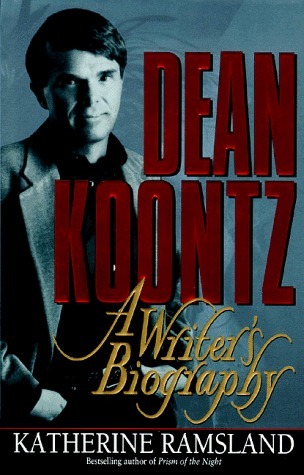 By KATHERINE RAMSLAND (HarperPrism; 1997)
By KATHERINE RAMSLAND (HarperPrism; 1997)
Katherine Ramsland, who’s best known for authoring several nonfiction books about Anne Rice, here turns her sights on another bestselling genre novelist: Dean Koontz. And she does a praiseworthy job, having extensively researched her subject and conducted copious interviews with him and his acquaintances, in service of what feels like an authoritative rendering.
The book’s major problem is an issue that afflicts Ramsland’s Anne Rice studies: it’s too fawning toward its subject, who comes off as a combination of Mother Theresa and Gandhi, and is apparently more pure-hearted than either. Then again, though, the portrait Ramsland paints is so thorough it’s easy to look beyond her superlatives, and discern how Koontz went from the likeable young writer he once was to the hectoring blowhard he currently is.
…the portrait Ramsland paints is so thorough it’s easy to look beyond her superlatives, and discern how Koontz went from the likeable young writer he once was to the hectoring blowhard he currently is.
The bane of Koontz’s existence, according to this book, is his alcoholic father. An abusive, weak-willed, sociopathic loser, Ray Koontz made his son’s life difficult throughout the latter’s impoverished Everett, Pennsylvania based childhood, and also during his later life, when the old man constantly begged his son for money and assistance. The primary reason Koontz never had children, it’s revealed, is that he’s concerned about the possibility of passing on his father’s sociopathic genes.
The primary reason Koontz never had children, it’s revealed, is that he’s concerned about the possibility of passing on his father’s sociopathic genes.
Another conviction bequeathed by Koontz’s father is that Freudian theory, with its belief in acquired morality, is complete horseshit. Koontz harbors a far starker, more black-and-white vision of good and evil, which explains why in all his post-1980 novels his characters are either really good or really bad.
Regarding Koontz’s pre-1980 output, it consists mostly of paperback science fiction novels that include the 1973 classic DEMON SEED. Koontz also turned out smut novels (he insists he only wrote two such books but collectors suggest there were many more), espionage thrillers, shoot-‘em-ups, gothic potboilers and (in 1973’s HANGING ON) a comedy. A varied and impressive output, to be sure, but Koontz was determined to break out of the midlist and write bestsellers—which, starting with 1980’s WHISPERS, he accomplished.
Unfortunately his output grew increasingly preachy and formulaic. Koontz’s post-1980 novels, which includes PHANTOMS, STRANGERS and WATCHERS, generally contain thriller plots (often with a tinge of the science fiction tropes of his earlier books) spiced with sappy romance and forced happy endings, in addition to the Either/Or morality to which he’s become wedded.
Koontz’s post-1980 novels, which includes PHANTOMS, STRANGERS and WATCHERS, generally contain thriller plots (often with a tinge of the science fiction tropes of his earlier books) spiced with sappy romance and forced happy endings, in addition to the Either/Or morality to which he’s become wedded.
Speaking of weddings: Koontz married his high school sweetheart Gerda in 1966, and they’ve been together ever since. It would seem an idyllic marriage, with Gerda having devoted her life to serving her hubbie’s literary output, but there are suggestions that not all is well in the Koontz marriage, such as Gerda taking a vacation to Paris in defiance of the wishes of her ultra-reclusive spouse.
Beyond that Koontz’s existence appears to be quite sedate. There’s been ugliness, of course, including an unspecified crime Gerda claims to have witnessed that forced the Koontzes out of their former Las Vegas home, as well as Koontz’s ill-advised stint as chairperson of the Horror Writers’ Association (not a great decision for a writer who admittedly desires not to be typed as a horror writer).
Overall, though, Dean Koontz’s life has proceeded just as you’d expect it to given that he doesn’t overeat, brawl, take drugs, womanize or, apparently, experience self-doubt of any sort. For those things I’d recommend tracking down a biography of Stephen King, a far more interesting and complex figure, and one who writes better books.
Overall, though, Dean Koontz’s life has proceeded just as you’d expect it to given that he doesn’t overeat, brawl, take drugs, womanize or, apparently, experience self-doubt of any sort. For those things I’d recommend tracking down a biography of Stephen King, a far more interesting and complex figure, and one who writes better books.
